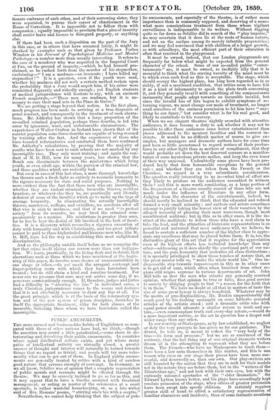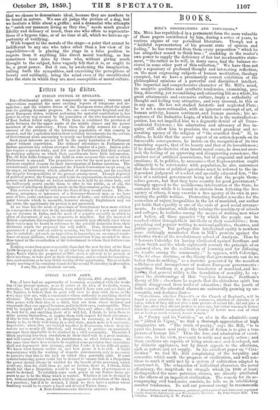PUBLIC AMUSEMENTS.
THE more earnest and business-like habits of Englishmen as com- pared with those of other nations have had, we think,—though the assertion may sound a little paradoxical,—some share in de- teriorating andfrivolizing their public amusements. In countries where equal intellectual culture exists, and yet where many paths of intellectual activity are virtually closed, a greater amount of thought and interest will naturally be turned towards things that we regard as trivial, and people will try more vehe- mently what can be got out of them. In England public amuse- ments are generally treated by critics with a kind of careless good nature that savours strongly of contempt. In Germany, as we all know, Schiller was of opinion that a complete regeneration of public morals and manners might be effected through the theatre. We may be scarcely inclined to go so far as this, and it may appear that to have a Goethe occupied with theatrical management, or acting as master of the ceremonies at a court spectacle, is rather wasteful housekeeping, or, as a late writer said of Mrs. Hemans' poems, " stirring one's tea with a sceptre." Nevertheless, we cannot help thinking that the subject of pub-
lie amusements, and especially of the theatre, is of rather more importance than is commonly supposed, and deserving of a some- what more conscientious treatment from those whose vigilant surveillance is indispensable to its welfare. Without digging quite so far down as Schiller did in search of the " play impulse," we may ascertain that it does lie at the roots of human nature, and not on the surface among its merely infantile propensities ; and we may feel convinced that with children of a larger growth, as with schoolboys, the most efficient part of their education is often that received in the playground. It must be owned, indeed, that our London playgrounds are frequently far below what might be expected from the general character of the school. Some of our so-called public " enter- tainments" are, it must be owned, so ineffably silly that it is mournful to think what the craving vacuity of the mind must be to which even such food as this is acceptable. The stage, which should occupy the highest place, has long been regarded as in so sickly, if not a moribund condition, that critics seem to have felt it as a kind of inhumanity to speak the plain truth concerning it, and they generally treat it with something of the compassionate insincerity that people adopt towards an incurable invalid, but since the invalid has of late begun to exhibit symptoms of re- turning vigour, we must change our mode of treatment, no longer avail ourselves of the ominous permission to let him have " any- thing he can fancy," but consider what is for his real good, and likely to contribute to his recovery. When we see elegant theatres nightly crowded with attentive audiences, it does become a duty to ask whether it may not be possible to offer those audiences some better entertainment than pieces addressed to the meanest faculties and the coarsest in- stincts. It would be no difficult matter of course to give ex- amples, but managers and dramatic authors have for some time past been so little accustomed to regard notices of their produc- tions in any other light than as matters of compliment, that they would probably set down the best deserved censure as a manifes- tation of some mysterious private malice, and keep the even tenor of their way unmoved. Undoubtedly some pieces have been pro- duced lately that form honourable exceptions to the general rule ; and whether they are taken from the French or the Cherokee, we regard as a very subordinate consideration. The question really interesting to us is—what kind of effect are they likely to produce on the audiences assembled to witness them ? and this is more worth considering, as a large portion of the frequenters of a theatre usually consist of those who are not much under the influence of literature in any other form. Judging from the character of the entertainment, indeed, we should mostly be inclined to think that the educated and refined formed a very small minority ; and authors and actors sometimes attempt to justify taking the lowest view of their vocation by the alleged necessity of pleasing their most numerous, though most uncultivated auditors; but in this as in other cases, it is the in- stinct of the multitude to follow those who have a real claim to take the lead, and the attraction of histrionic representations is so powerful and universal that most audiences will, we believe, be found to contain a sufficient number of the higher class to appre- ciate any excellence that may be placed before them. It is, too, the distinctive glory of this art that it requires for the appreciation even of its highest efforts less technical knowledge than any other—addressing as it does chiefly the emotional part of our na- ture, and the pure humanity that underlies all class distinctions ; it is specially privileged to show those touches of nature that, as the great master tells us, " make the whole world kin." One in- dispensable step towards improvement in this as in other cases is to get rid of cant, which often when banished from other re- gions still reigns supreme in various departments of art. John Mill tells us that the man who attacks any generally received opinion, whether that opinion be true or false, does good service to society by obliging people to find " a reason for the faith that is in them." We have no doubt at all that in matters of taste the rise of some great heresy is always beneficial. Whatever may be the merits of prx-Raphaelitism, Mr. Ruskin unquestionably did much good by his dashing onslaught on some hitherto accepted articles of the artistic creed ; and a dramatic critic who with equal power should advocate a similar return to truth and na- ture,—even commonplace truth and every-day nature,—would do a more important service, as the art in question has a deeper and wider range than any other. In our worship of Shakespeare, as by law established, we neglect or defy the very precepts he has given us for our guidance. The drama, lie tells us, is meant to reflect the " very body of the time—its form and pressure;" but we are so convinced of the contrary, that the last thing any of our original dramatic writers dream of is the attempting to represent what they see before them. The French—who have no Shakespeare to teach them— have been a law unto themselves in this matter, and this is one reason why even on our stage their pieces have been more suc- cessful, and deservedly so, than our own. Our play-writers are still haunted by the notion that they are to seek for their models not in the nature they see before them, but in the "writers of the Elizabethan age," and not look with their own eyes, but with the curiously coloured spectacles of the " elder dramatists." Sir Edward Lytton knows better, and his plays have accordingly kept resolute possession of the stage, when others of greater pretension have been swept into speedy oblivion. It certainly requires greater skill of hand to afford a satisfactory representation of familiar characters and incidents, than of some fantastic creations
that we choose to denominate ideal, because they are nowhere to be found in nature. We can all judge the picture of a dog, but we hesitate a little about a griffin; and a dramatist who attempts to " catch our manners living as they rise," needs much greater fidelity and delicacy of touch, than one who offers us representa- tions of a bygone time, or of no time at all, which we have no op- portunity of verifying. With respect to the morals of the stage—a point that cannot be indifferent to any one who takes other than a low view of its capabilities—it is placing the stage in a false position to require from it anything like direct moral teaching, as has sometimes been done by those who, without giving much thought to the subject, have vaguely felt that it is, or ought to be, a great power. But it can, by awakening the imagination, calling forth the sympathies, and exercising the perceptions of beauty and sublimity, bring the mind even of the uncultivated into the state in which they are most susceptible of moral culture.



























 Previous page
Previous page